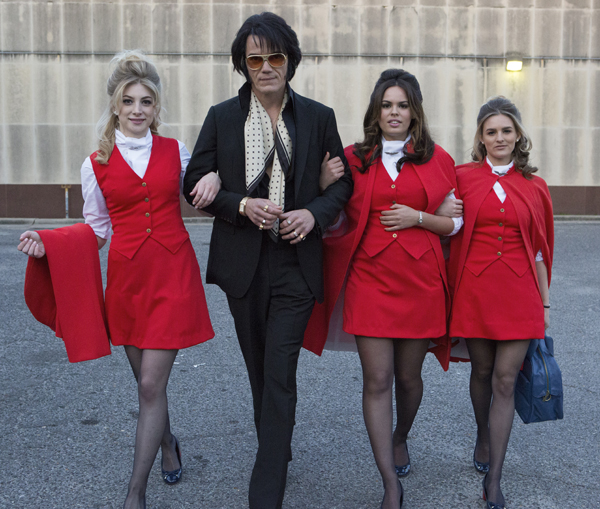![]() Elvis Presley and Richard Nixon. One man practically invented rock ‘n’ roll with his swiveling hips, while the other stood firmly against cultural and social progress as arguably the squarest public figure in American history. Other than being among the most recognizable figures of the 20th century, they would seem to have little in common. Yet as director Liza Johnson’s Elvis & Nixon shows, they were kindred spirits in their own special way.
Elvis Presley and Richard Nixon. One man practically invented rock ‘n’ roll with his swiveling hips, while the other stood firmly against cultural and social progress as arguably the squarest public figure in American history. Other than being among the most recognizable figures of the 20th century, they would seem to have little in common. Yet as director Liza Johnson’s Elvis & Nixon shows, they were kindred spirits in their own special way.
Michael Shannon plays Elvis as a sort of bejeweled Bill Hicks, a lean, intense figure in black. Shannon doesn’t look like Elvis at all, and the filmmakers don’t use any prosthetics to make him more closely resemble the King. However, we come to buy his portrayal thanks to the deft costuming and the reactions he gets wherever he goes. Similarly, Kevin Spacey, who plays Nixon, doesn’t much look like the much-maligned ex-president, but he effectively taps into his essence (doubtlessly drawing on years of playing an equally Machiavellian politician on House of Cards). The viewer gets more of a sense of Nixon’s character from the paranoid nature of his White House, as well as the behavior of his aides (played by Evan Peters and a much-abused Colin Hanks).
The title characters meet in 1970, when both are still at the peak of their powers yet facing imminent decline. We first meet Elvis when he famously shoots his TV, which the film makes us understand is due to the constant stream of menacing news reports—of riots, protests, marches, and the general unrest of the late ’60s. Sensing that America is at a crucial crossroads, Elvis takes his pop culture moniker of the King seriously: he feels that his subjects are going astray and need their wise, benevolent monarch to save them.
So he heads to the White House, meeting ordinary folks along the way who treat him like an absolute god on Earth. (In a small, but key role, Ashley Benson believably portrays her airline worker’s brief, unremarkable encounter with Elvis as a life-changing moment.) Johnson and Shannon’s vision of the King seems to be of someone masking a stunted, eccentric, vain, and deeply tacky cheeseball. Worse yet, he is basically proto-Alex Jones with his dubious, conspiracy-tinted logic and blustery pronouncements befitting an eighth grader.
How fitting it is then that Elvis meets his match—or is that his soulmate?—in Nixon, who in 1970 was still two years away from Watergate. The cementing of their bond is swift: both men hate the Beatles, both are familiar with the media treating them more like pop culture symbols than people, and both share the same deep lack of coolness. Indeed, there’s a scene in which Elvis starts ranting about how journalists “just make things up,” and we know from Nixon’s vigorously nodding that he recognizes a kindred spirit.
Elvis & Nixon is fascinating for its tight focus on a single meeting between self-styled American kings—in the case of Nixon, what could be more monarchic than proclaiming that when the president does something illegal, it is not illegal? Johnson plays up the sense of mystique around each of these flawed men, filling the screen with a whole lot of headshots, close-ups, and the like—you hardly ever see below anyone’s shoulders during the whole movie. Interestingly, the filmmakers choose to make their Elvis no less convinced of his own royal majesty than the president, but he is also more aware that his kingliness is a persona and a façade.
Elvis & Nixon is very funny at times and boasts actors fully committed to communicating the bizarreness of a particular time and place in American history.

















Leave A Comment